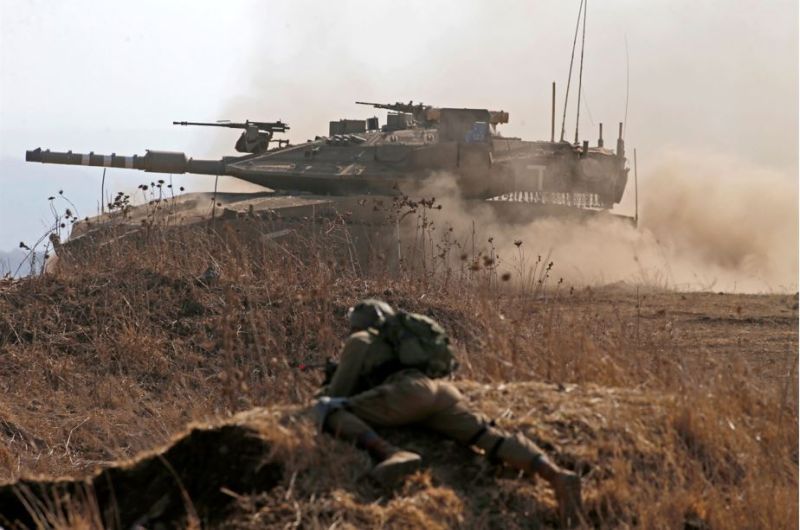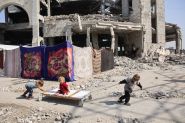- Home
- Middle East
- Israeli Cabinet Approves Occupation of Mount Hermon

An Israeli tank in the Golan Heights ©AFP
The Israeli cabinet on Sunday, has approved the occupation of Mount Hermon and its surrounding demilitarized areas. Israeli Prime Minister Benjamin Netanyahu said Sunday he had ordered the Israeli military to "seize" a UN-patrolled buffer zone between the Israeli- and Syrian-controlled Golan Heights.
The premier said a 1974 disengagement agreement with Syria "has collapsed", so he "directed the (military) yesterday to seize the buffer zone and the commanding positions nearby. We will not allow any hostile force to establish itself on our border."
Israel had already said the day before, as the Islamist-led rebels swiftly advanced across Syria, that its soldiers had entered the UN-patrolled buffer zone to assist peacekeepers in repelling an attack.
On Sunday, the army announced a troop deployment there, citing "the possible entry of armed individuals into the buffer zone".
"Following the recent events in Syria... the IDF (army) has deployed forces in the buffer zone and in several other places necessary for its defence, to ensure the safety of the communities of the Golan Heights and the citizens of Israel," a military statement said.
Israeli forces "will continue to operate as long as necessary in order to preserve the buffer zone and defend Israel", it added.
The statement stressed that the Israeli military "is not interfering with the internal events in Syria".
Closed military zone
Another statement said that the entire Golan Heights, near the Syrian border, was now considered a “closed military zone”.
Since the rebel coalition, led by Islamist group Hayat Tahrir al-Sham, began its renewed offensive against the forces of President Bashar al-Assad on November 27, Syrian government forces have left positions near the Israeli-held Golan, according to a war monitor.
Rami Abdel Rahman, head of the Syrian Observatory for Human Rights, said on Saturday that army forces had withdrawn from positions in Quneitra province, which includes part of the Golan Heights.
Most of the plateau has been occupied since 1967 by Israel, which later annexed it in a move not recognised by most of the international community.
In 1974 the buffer zone was established, separating the Israeli-held and Syrian territories, with UN peacekeepers stationed there since.
A UN Peacekeeping spokesperson said on Saturday that UNDOF personnel had observed "unidentified armed individuals in the area of separation, including approximately 20 who went into one of the mission's positions in the northern part of the area of separation".
The Israeli army said it was "assisting the UN forces in repelling the attack".
The UN spokesperson said that "peacekeepers continue to carry out their mandated activities on the Golan".
On Sunday, Lebanese media outlets reported an Israeli strike on Quneitra targeting an arms depot. The Israeli military declined to comment.
In a separate statement, the Israeli military said schools in the northern Golan Heights, in an area covering four Druze towns, would move to online teaching, also declaring a "closed military zone" in agricultural lands in the area.
Explosions were heard in Syria in the Mazzeh area of Damascus, two security sources told Reuters on Sunday in a strike attributed to Israel. Intelligence sources said Israeli jets attacked the Khalkhala airbase in the south of the country.
In parallel the Israeli Air Force targeted Syrian army weapon depots near the Mazzeh military airport in the suburbs of Damascus, as well as in other parts of the country, according to the Syrian Observatory for Human Rights (SOHR), speaking to AFP.
The monitor said Israeli strikes targeted government security buildings in Damascus on Sunday, as an AFP correspondent reported the strikes and subsequent fire, hours after rebels overran the capital.
"Israeli strikes targeted a security complex in Damascus near the former regime's buildings" including intelligence, customs and a military headquarters, said the Britain-based Syrian Observatory for Human Rights. An AFP photographer saw buildings ablaze in the security complex, which includes military intelligence.
“Israeli strikes targeted positions of the Syrian army’s Fourth Division near the Mazzeh military airport,” said Rami Abdel Rahman, head of the SOHR, adding that the targets included weapon depots.
Additional depots were hit near the towns of Inkhil, Sweida, Daraa, and Khalkhala in the southern part of the country.
The Israeli army carried out over a total of hundred strikes during the day.
With AFP
Read more



Comments